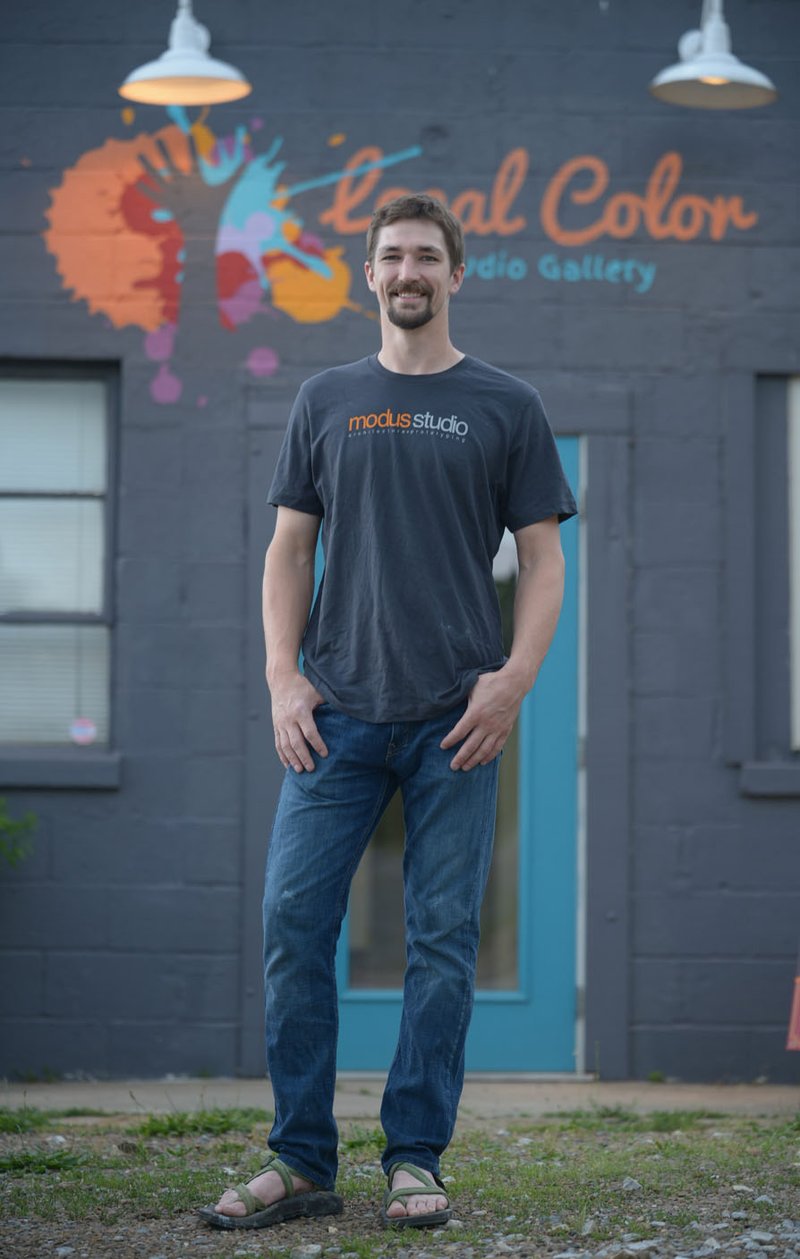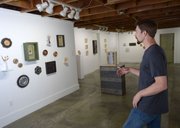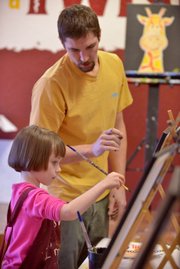Alex Cogbill is more than happy to talk about Local Color Studio Gallery, the intimate, sleek art gallery he founded and operates in south Fayetteville. He's proud of his work carving out the minimalist interior where the targeted, sharp lighting keeps the eye focused on the carefully curated work of local artists.
But talk to him longer than 10 minutes or so, and you'll notice something: The conversation keeps returning to the subject of teaching. In addition to running and curating the gallery, Cogbill offers art and music classes year-round to students of all ages.
Classes
Register now for classes and summer camp at Local Color Studio Gallery by visiting the Facebook page at facebook.com/localc….
It's obvious it's what he was meant to do.
It was almost a fluke that he found out that teaching was his calling: He admitted with a laugh that he chose education as a focus in college initially because it had the easiest math requirements.
"I was studying geology because I was very good at visual memorization, and I was a big climber at the time, always outside," he said. "But there's one problem with that -- you have to be good at math. I've improved so much more in math now because I've been building my geometric sculptures, which require math. But, at the time, I was just looking at the teacher, and it was like she was saying, 'Wah wah wah wah wah.' I had to pass calculus II, and I couldn't pass trigonometry. I thought, 'You know what? I'm going to go back to art.' But here's the funny thing about that: If you do studio art, you still have to take nine hours of math -- or something like that -- but if you take the education [track], all you have to pass is college algebra."
Cogbill's students can thank math for delivering their enthusiastic, creative teacher to them.
"Once I got into teaching, I said, 'This is what I'm supposed to do,'" Cogbill remembered. " I did some student teaching and did shadowing and all of that stuff, and I loved every second of it. My mom is a speech therapist and a teacher, and I grew up with that. I would go to her classroom and watch her work."
Cogbill said watching his mother's interactions -- particularly with the students living in poverty, with whom she often worked -- emphasized to him the need for accessible art education for all students, not just those who can afford it.
"A big time focus here is inclusiveness," he said. "People tell me all of the time, 'You're so cheap.' I say, 'Yeah, I don't want to be exclusive.' I really don't want anybody to say, 'I would like to go to an art class there, but it's too expensive.' I want this to be a true community art center." Through generous donations from loyal patrons, Cogbill said, he's even able to offer scholarships for classes.
Cogbill currently offers painting and drawing classes for adults and kids, teen art portfolio classes and beginning guitar lessons. Now that he's taken over a space directly adjacent to the art gallery, there will soon be more class options available.
"I'll have a pottery wheel, and I have a kiln," he said "I'm going to have a small dark room. I'm going to have a computer station with a nice printer where students can do poster-sized prints. I've got a projector where I can show all of my lessons for the day."
With summer on the horizon, he's also got several art camps for kids ages 3 into the teen years.
Cogbill said, that for him, teaching art is less about the product than it is about the process.
"I want to be able to come in and have a relationship with each person and figure out, 'Why are you here?'" he said. "'What are you getting out of it?' I want to keep it small for that reason.
"I've always used art as a release. And that's something I focus on [with] the kids that I teach. I've had some kids that I've had for almost four years, and I've been teaching and watching them grow."
Cogbill knows well the benefit art can have on a young person -- it's been a fixture in his life from an early age.
"I would go out with my pen and pad and some colored pencils and draw, out in nature," he remembered. "I was really into nature photography. When I was, like, 10 years old, I would be out in the woods with my camera trying to get a picture of a woodpecker -- not thinking of it as I was doing it, I just liked to do it. I never thought about doing it for a living or anything like that. My grandmother was a painter, and she gave me my first set of paints and an easel that my grandpa built. It's the easel I still use, and I still use it to teach with. Both of them have passed away, and so it's kind of a way to keep them alive, which is what I think art does a lot, too. You stay alive through the work you create.
"I remember one time, I was kind of sneaking through this guy's property with my pencils and a drawing pad to go up to the Arkansas River. There was a place where they had dug out some shale, and it was really pretty down there. The guy came out and said, 'What are you doing? People are out here using drugs. What are you doing?' And I said, 'Well, I just want to come and do some art.' I opened my backpack and showed him my drawings and art supplies, and his whole face changed. He opened the gate for me.
"So I started to see this positive response because of my creativity. So I try to be that positive interaction with my students. I focus way more on the process. I don't care about your end product. I have done a lot of research and reading, and a lot of times in our culture -- especially with children who are highly intelligent -- we praise their product. They don't even want to be challenged anymore. They're scared of the challenge part of it because they're scared they're not going to get the praise at the end if they didn't do well. So I really focus on how they work through a problem. That's what they get praised for."
Cogbill's particular area of expertise is sculpture: It was his emphasis at the University of Arkansas, and he has made a name for himself in the art form, creating and installing several public works of art -- including a piece along the bike trail at Wilson Park in Fayetteville and a large installation on Main Street in Little Rock. For the latter project, Cogbill submitted his design to the SoMa Public Art Competition and was one of three artists chosen for separate projects along the street. He used his commission from the project to open Local Color four years ago. He credits support from his parents and fiancee, Camille Montgomery, for helping to make that dream come true.
Meanwhile, the energetic (and busy) Cogbill works a day job at the architectural design firm Modus Studio in Fayetteville, where he serves as a fabricator.
"I work in steel and wood, decorative elements for the building and bars, tables and stuff like that," he said. "It informs my artwork a lot, too, because I didn't work with wood a lot before. Now I've done two whole series just in wood and metal pieces. If you see the Modus building, we charred all the wood on the outside of that building and installed it, so that has informed my work as well. Definitely working there has improved my craftsmanship." Cogbill and Modus lead fabricator Paul Siebenthal are currently working on a collaboration that will eventually be installed in Fort Smith.
But with all of this on his plate, Cogbill still manages to ensure that Local Color Studio Gallery has a new installation each month.
"Usually on the second Saturday of the month, we have a reception for the show. Then, when it closes, I have a week to patch holes and hang the next show. Then, we promote and do another show."
Cogbill noted that his is one of only a handful of art galleries in Fayetteville right now. But he has hopes the community will continue to grow, especially with the expansion of the University of Arkansas school of art.
"The Phoenix [Gallery] just opened up here, and I thought, 'Cool!' I like their stuff," he said. "It shouldn't be a competitive thing -- the more the better. I would love to have it build up to where we have more of an art district, and you could do a gallery hop. It doesn't have to be a big competitive thing -- we can support each other."
The words"support," "community" and "inclusiveness" are words one will hear frequently from Cogbill when he talks about his work. It seems Local Color Studio Gallery has given him an opportunity to expand all three in his life.
"I've met so many new people that I had no idea they wanted to be a part of the art community, wanted a show," he said. "But I love that -- that I've gotten to meet people that I never expected to, that have become great friends. That's so awesome and has opened up so many different parts of my life that I never expected."
NAN Our Town on 06/14/2018



